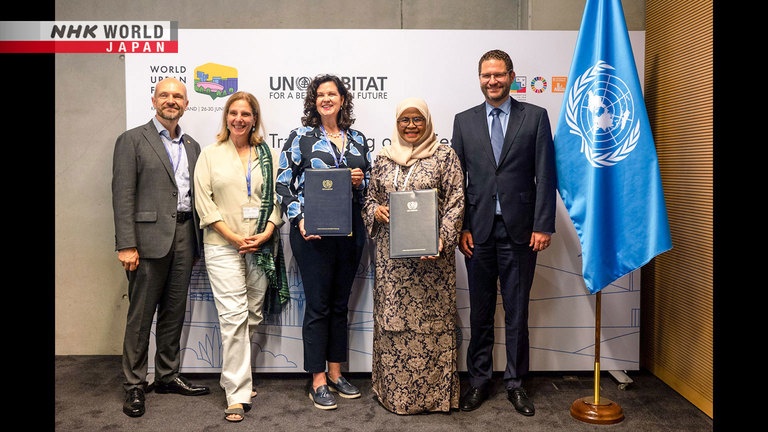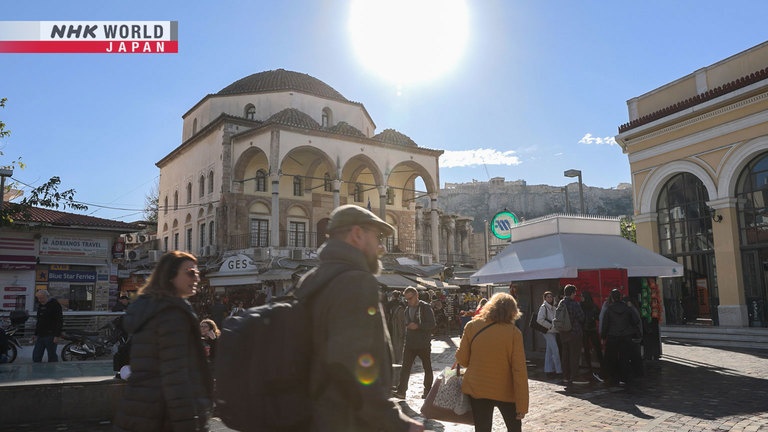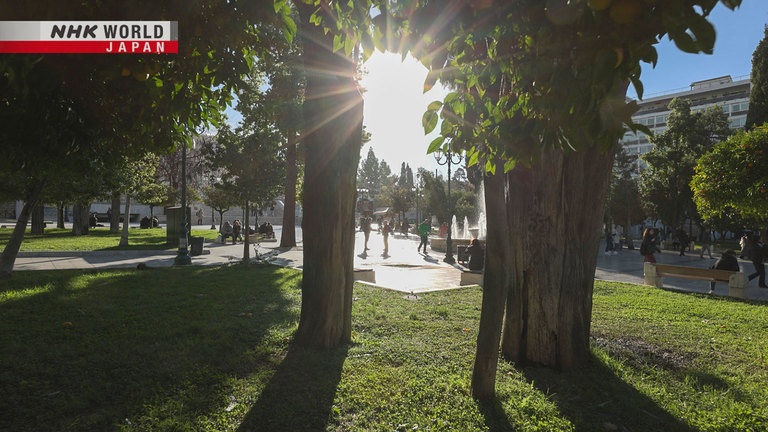Fighting Extreme Heat: Eleni Myrivili / Global Chief Heat Officer
Stressing the need for awareness, Global Chief Heat Officer Eleni Myrivili leads the response to extreme heat that threatens lives and livelihoods worldwide. She outlines ideal countermeasures.



Transcript
Direct Talk
Ever since the Industrial Revolution,
the Earth has been getting hotter.
The year 2023 was the hottest on record.
It's believed to have been the hottest summer
in a little over 100,000 years.
Against this background, Eleni Myrivili,
former Deputy Mayor of the City of Athens,
was appointed as the
first "Global Chief Heat Officer"
to lead international measures
to fight extreme heat.
In December, Myrivili participated in
an international conference
to discuss climate change measures.
The conference attracted a lot of attention.
There was a new research
that showed that the number of deaths
linked to the heat of the summer 22
was actually above 61,000 people.
We've been talking about
global warming for a very long time,
but we haven't really
been talking about heat.
How can we protect our lives and survive
in a world becoming increasingly hot?
We ask Myrivili for her answer.
Fighting Extreme Heat
We call heat "the silent killer"
because, unlike hurricanes or floods,
we don't see it.
Heat silently goes into the city
and you don't see the results
until months later
because it affects on a cellular level
the living organisms.
It is really staggering the amount of people
that we lose every year all around the world.
They say it's about half a million people
and it's growing every year
because we're getting hotter and hotter.
It also affects the economies,
our productivity.
but also it affects our infrastructure,
for example, our energy systems,
our public transportation has problems like,
for example, the train tracks can buckle,
the airplanes cannot lift up.
To call attention to extreme heat,
Myrivili and her fellow meteorologists
launched a pilot program
to classify heat waves and name them
like hurricanes, starting in 2021.
Even though we've been
talking about global warming,
cities and policy makers and decision makers
haven't really been focusing on heat
as a serious risk
because it's visually not present.
And so this is part of why
I decided to focus on it.
Athens, Greece
Born in Athens,
Myrivili began her career
as a university professor
specializing in anthropology.
However, her life was changed
when a certain series of events occurred.
in 2007, there were these fires
that kept burning for weeks in Greece
that burned a big part of Greek forests
and also killed several people
and burned villages.
When I look at forest burning,
it's a feeling.
It's a great feeling of devastation
and of a sense of powerlessness
and a sense of extraordinary loss.
At the time, only arson was talked about
as one of the possible causes.
The relationship between wildfires
and extreme heat was not discussed.
When we are faced with something
that makes us feel powerless,
the best thing to do is to act,
If I don't act, I feel like
I don't have the choice but to act.
Myrivili then threw herself into politics.
There was an awakening
in people's consciousness
and we joined the Green Party
and I became part of the leadership
of the Green Party for a few years.
But then I didn't really like party politics.
Finding little hope of achievement
working for a political party,
Myrivili quit the Green Party
and returned to academic life.
Then, she encountered a book.
It is called If Mayors Rule the World,
and it's about cities
and how amazing cities are
and how creative, how they're more democratic
how mayors are closer to the people
and to the problems.
It was a revelation that I could get involved
in politics in a different way
that didn't have to do
with governments and pol and
party politics.
But it had more to do with cities
which were closer to the problems
and to more creative solutions
and closer to the people.
And so that's why I decided to run for local
government here in Athens and got elected.
In 2015, Myrivili was elected
Deputy Mayor of the City of Athens
for Urban Nature,
Resilience & Climate Change Adaptation.
And in 2021, she was appointed
Europe's first Chief Heat Officer,
or CHO, of the City of Athens.
A Chief Heat Officer is somebody that is
wakes up every morning
trying to figure out how to help the city,
first, protect the most
vulnerable populations to heat,
and second, how to make the city cooler.
This job is like, is what keeps me alive
and what gives me hope
because I feel that I'm moving forward
and I'm doing something
that can actually possibly help a little bit
in dealing with what scares me most.
As of January 2024, female Chief Heat Officers
are active in eight cities around the world.
A Chief Heat Officer
is somebody that can coordinate work
that happens in different departments,
in different sectors in the city
and try to bring them together.
But also the Chief Heat Officer can bring
different stakeholders into the game,
create neighborhood community discussions,
and find out how can we
best support the communities
that are the most vulnerable communities.
Cities, the way that we build them today,
we build them with concrete and
cement and asphalt and glass and steel.
These types of materials
absorb heat during the day
and at night they release heat.
The heat emitted by cars
and air conditioners,
with pollutants added, further increases
the hazards of urban life.
To identify issues in the City of Athens,
Myrivili surveyed the actual damage
by creating a heat map.
It analyzed various aspects,
including population density,
the number of elderly people,
and the level of poverty.
Heat has this capacity of
going through the city
it basically attacks the people
that are socioeconomically most vulnerable,
the people that live in
the poor neighborhood
or that live in informal housing
and or are homeless, for that matter.
But also it affects the people that are weak
because they have preexisting
health conditions.
We know that heat exacerbates conditions
for all kinds of conditions
related to mental health,
including raising violence in communities
and gendered violence.
We know that from the Red Cross that
the people that die from heat in our city,
about 83% of the people that we lose from heat
are old people living alone in their homes.
In response to these issues,
Myrivili opened a helpline for elderly people
living alone who suffer from extreme heat.
She introduced a heat map application
that allows users to check water
locations and cooler routes.
In addition, she worked to expand parks
and increase water locations
where people can cool off.
We usually have covered streams
and water natural water sources.
We have to bring water to the surface
and create permeable surfaces
so that the water that comes through rains
actually can evaporate
and create cooler again.
We can avoid floods and
create cooler environments.
Myrivili turned her attention
to the ancient Hadrian's Aqueduct.
A plan is underway to create a large-scale
24-kilometer "green corridor"
by utilizing water drawn down
from the mountain to the city
to create green spaces around the area.
If we build our cities in ways
that are more nature positive,
we already know that we will be saving lives.
A report that came out in 2023, said that if we
have at least 30% tree canopy in our cities,
we will lower the mortality that is linked
to extreme heat by one third.
In recognition of her achievements in
combating extreme heat in the City of Athens,
Myrivili was appointed the world's first
"Global Chief Heat Officer" in 2022.
I fear for the future, for how our communities
and how our societies will survive
in more and more extreme weather conditions.
I'm worried about my daughter
and how she will survive and
how, what her life is going to be like.
It's estimated that by 2050, nearly 70%
of humanity will live in urban areas.
How can we survive in that situation?
We have to make sure that we save the people,
the most vulnerable people.
So we have to make sure that
we have ways in the city
that raise awareness, that
make people understand that they are at risk.
To make sure that
they have ways to protect themselves.
Places to go,
to understand how to drink,
how to dress, how to prepare
their home so that they're cooler.
So this is one thing.
What is most important is
to change cities for the future,
to prepare, to redesign cities
for the new climate era that we are facing.
We have to make our cities
radically nature positive.
We have to allow, again,
nature to be much more prominent,
which means taking away asphalt,
taking away cement and concrete,
breaking existing surfaces.
For example, in Seoul, South Korea,
an around 6-kilometer stretch of river and
greenery was restored by removing a highway.
As a result, the ambient temperature
was reduced by over three degrees Celsius.
Paris is also testing ways to use water
from the River Seine for local cooling,
and a tree-planting program is underway.
Before the industrial revolution basically,
people used to design cities
and design houses
very carefully and very well adapted
to the specific weather conditions
that they were building them in.
So they had come up with
very clever solutions
about houses in very hot climates
or houses in very cold climates,
and that were based on design and
on materials and on technologies
that were very precisely created
for these temperatures.
Athens' traditional houses
have thick white walls.
This is based on the traditional wisdom
that white coating materials have the property
of reflecting heat and not storing it.
So now the best kind of way to go about
is to figure out what are the old solutions
and bring them and combine them
with new technologies and new materials.
But most importantly,
we have to create teams of people,
multidisciplinary teams of people that bring
urban planners, architects, ecologists
and landscape architects,
even people that know thermodynamics,
together to design again cities
in different ways,
not by building first the buildings
and then invite people
to just create the parks,
which are little green areas between.
For many years, Myrivili has led the world
as a pioneer in the fight
against extreme heat.
She has always had a motto.
"Show care and champion what to care for!"
Not just for the ones you love,
but for the world and
for the ones that you don't know.
And for the animals and
for the plants and for the planet.
And I think that this is an important quality
that leadership should have.